Currently viewing: Governance creating value | Next: Remuneration committee report
Governance creating value
Board contribution to strategic delivery and value creation
The Truworths International board functions in terms of a formal charter and provides ethical and strategic direction, and leadership to the Group. The board is guided by the Group's Business Philosophy and is accountable for the overall strategic objectives aimed at delivering the outcomes (Vision) of the Business Philosophy, and for governance and the performance of the Group.
The board of directors periodically reviews the risks and opportunities it believes could have the most significant impact on the Group's ability to create and preserve value or prevent value erosion for stakeholders. In determining these material issues, the directors consider the Group's strategic objectives together with several internal and external factors, including the Group's strategies as formulated by executive management, the needs, expectations and concerns of its main stakeholders, and the risks and opportunities in the macroeconomic and trading environment.
In the 2024 financial period, the board reaffirmed that the Group's strategic objectives are aimed at delivering a diversified earnings profile and improved returns for shareholders, deriving benefits for stakeholders over the medium to long term. The board confirmed the Group's strategic objectives which are outlined in the Group strategy report.
During the period under review, the board confirmed that the material issues identified during the previous financial period for Truworths, Office and the Group remain appropriate. These material issues are aspirational fashion, supply chain, account management and retail presence for Truworths, aspirational fashion, supply chain and retail presence for Office, and human capital for the Group.
The board monitors progress on the implementation of the Group's strategies and supporting growth initiatives, and measures performance against both the agreed financial targets and the strategic objectives.
The board, supported by the boards of the principal operating subsidiaries, Truworths Ltd (in South Africa) and Office Holdings Ltd (in the UK), assesses on an ongoing basis whether the activities of the Group are creating value for its key stakeholders as defined by its vision for stakeholders. Refer to the Creating stakeholder value report.
GOVERNANCE ADDING VALUE
The Group's approach to corporate governance is to ensure it contributes to improved operational decision making and corporate performance, thereby reducing the risk of failure. The Group therefore aims for the relevant governance policies, structures and processes, which initially may have been brought into existence to ensure adherence with applicable regulation and codes of conduct, to add value and ensure corporate sustainability, and to enable the Group to take advantage of opportunities that arise.
OUR CORPORATE GOVERNANCE AIM IS ACHIEVED BY:
- Critically considering governance requirements to determine how they could be implemented in a value-adding way and in a manner that aligns with the Group's Business Philosophy
- Identifying opportunities in governance requirements for enhanced accountability, improved decision making, better risk mitigation and more comprehensive disclosure
- Conducting a thorough enquiry process before putting into place policies, reporting and monitoring mechanisms, and committee structures that are hallmarks of a sound corporate governance framework
- Periodically reviewing these elements and benchmarking the Group's initiatives against comparable companies and recommended best practice
Improved corporate performance arising from sound corporate governance has manifested itself in a number of ways in the Group over an extended period, including:
- Diversity and independence of opinion in board decision making with the aim of ensuring sound outcomes
- Improved operational decision making that takes into account the breadth of the perspectives expressed
- Maintenance of discipline and integrity in management's reporting to the board
- Enhanced levels of accountability and transparency by management to the board
- Meaningful risk management processes and controls that are practically embedded in day-to-day operations and decision making
- Better and more comprehensive integrated reporting of both financial and non-financial aspects to stakeholders
- High levels of assurance regarding the reporting by management to shareholders
- Achievement of an appropriate balance in meeting the expectations of the different stakeholders of the Group
It is the view of the board that, in a demanding operating environment, the sound governance framework has served to mitigate against the erosion of value and has, in fact, preserved and created value for the business and its stakeholders in the form of lower risk, ongoing sustainability and resilience, reasonable consistency of financial performance, sound stakeholder relationships, high levels of legislative compliance and reputational integrity.
In addition to its responsibility for maintaining a sound corporate governance framework, the board is ultimately responsible for the Group's environmental and social practices, and accordingly has oversight responsibility for the environmental, social and governance (ESG) strategy and performance. The board has delegated its responsibility for monitoring the Group's ESG performance, particularly in relation to environmental and social matters, to the Social and Ethics Committee. Several of the directors have experience in managing sustainability issues and risks or have undergone relevant training (refer to table of board of directors' expertise). Details of the Social and Ethics Committee's activities during the year and how it assisted the board to monitor the Group's ESG performance is contained in the Social and Ethics Committee Report 2024 available on the website www.truworths.co.za/reports.
INNOVATION
The board promotes and enables innovation and complete alignment with the Business Philosophy in a number of ways, including:
- Ensuring that strategic projects carried out by management emphasise innovation and creativity in areas such as the development of merchandise ranges, the design of information systems, the adoption and use of artificial intelligence (AI) and machine learning, the strategies used to enhance the customer account offering, the design of stores and the expansion of e-commerce.
- Linking management's short and long-term rewards and incentives to its performance in delivering measurable outcomes that encompass innovation in relation to such strategic projects.
- Receiving presentations by management at board meetings on strategic projects and other business initiatives and critically assessing the extent of innovation evident in the progress and the benefits of such projects and initiatives.
- Delegating the responsibility for monitoring progress on strategic and other projects to the Chief Executive Officer (CEO) who, at project report-back days held quarterly, stimulates innovation and creativity by challenging management to consider new concepts, designs, systems and processes when proposing solutions to business issues.
- Communicating and emphasising to management the importance of practically applying in everyday operations the Group's Business Philosophy, at the heart of which lies innovation.
BOARD DELIBERATIONS
OFFICE
A material matter considered and discussed by the board during prior reporting periods related to the performance of Office, and the interventions planned by executive management to address the issues that had contributed to its disappointing levels of revenue and profitability in the past. In the reporting period, the board monitored the further successful implementation of these plans and was pleased to note a further material improvement in both its operational and financial performance. The matters monitored included:
- Increased operational alignment with Truworths
- The effect of having repaid Office's borrowings and availability of cash resources to deploy within the business
- Further rationalising the store portfolio by reviewing leases and closing underperforming stores
- Capitalising on opportunities to grow Office's retail footprint through the opening of new stores in strategically important locations as well as the reconfiguration of existing trading space
- Office's operational and capital expenditure and cash flow management to ensure alignment with the medium-term strategic direction
- The fair value assessment of the Office trademarks and considerations regarding the reversal of previously recognised impairment losses
- Aligning merchandise buying and planning processes with Truworths' best practices
- Aligning marketing and communication strategies, and strengthening relationships with international footwear brands
- The performance of the executive management team
The board was most satisfied with the implementation of these action plans and will continue to assess their effectiveness on an ongoing basis with a view to maintaining the business on a positive growth trajectory.
NON-EXECUTIVE DIRECTOR SUCCESSION
A further significant matter considered by the board is succession planning for long-serving non-executive directors. The board had embarked in recent years on a process of refreshing the non-executive component of the board in a systematic manner that will enable the Group to have continuity in terms of the important and ongoing contribution from long-standing directors, while newly appointed non-executive directors grow their knowledge of the Group and begin to influence board deliberations in a substantive manner. The board's succession process will look to increase skills and expertise in key areas such as 'Human resources and transformation' and 'Sustainability matters'.
Over the past six years, eight new non-executive directors have been appointed to the board as part of this succession strategy. It is envisaged that, as they have been and are to be promoted to committee membership, long-serving non-executives will be retiring from the board.
Daphne Motsepe and Wayne Muller were appointed as additional independent non-executive directors of the company with effect from 1 August 2023. Wayne was also appointed as a member of the Remuneration and Nomination committees with effect from 1 September 2023.
Maya Makanjee, an independent non-executive director since 2018, retired at the AGM on 9 November 2023.
With effect from 1 September 2023, Hans Hawinkels was appointed lead independent director.
CEO AND SENIOR EXECUTIVE SUCCESSION
The succession for the CEO and senior executives remains an important consideration for the board.
The appointment of Sarah Proudfoot and Emanuel (Mannie) Cristaudo as the Group's Joint Deputy Chief Executive Officers took effect from 1 October 2022. The board remains confident that Sarah and Mannie, together with the seven directors and 10 divisional directors of Truworths, and one director and four divisional directors of Office, are the right team to transition the Group in future years by retaining the strength of the Group's unique DNA while at the same time being able to continue to move the businesses forward.
Michael Mark retains the position of Group CEO and chairman of the material subsidiary companies. The appointments of the Group Joint Deputy CEOs confirm the board's firm belief in their competence and leadership, and that of the directors and divisional directors who report to them.

During the period under review, board deliberations included the following:
| NOTED | CONSIDERED | APPROVED | AUTHORISED | RESOLVED | ||||
| KEY ISSUES | KEY ISSUES | KEY ISSUES | KEY ISSUES | KEY ISSUES | ||||
|
|
|
|
|
||||
| ROUTINE MATTERS | ROUTINE MATTERS | ROUTINE MATTERS | ROUTINE MATTERS | ROUTINE MATTERS | ||||
|
|
|
|
|
GOVERNANCE FRAMEWORK
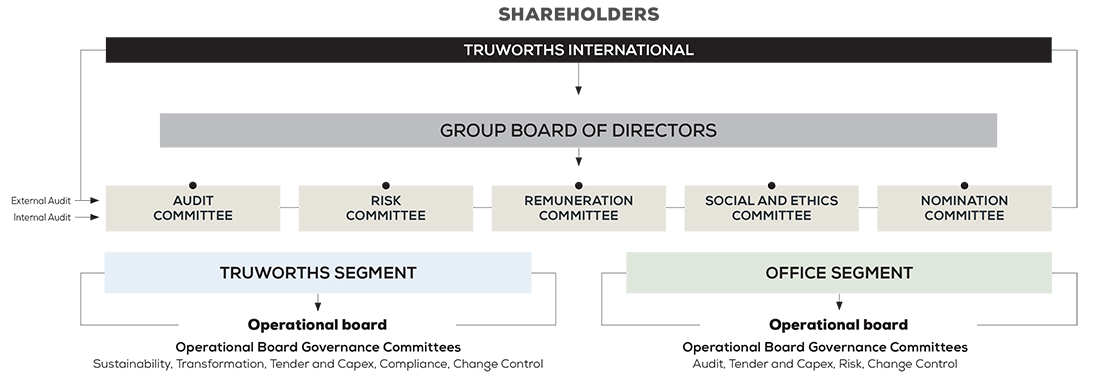
BOARD AND COMMITTEE MEETING ATTENDANCE
For the reporting period, the directors achieved a 99.4% (2023: 96.6 %) level of attendance at board, committee and annual general meetings.
BOARD PERFORMANCE
An annual evaluation is conducted to assess the effectiveness of the board as a unit. The evaluation concluded that the board's overall functioning and governance were excellent, and further indicated that:
- The board executes its role at a high-performance standard, with significant strength demonstrated in its relationship with the CEO and other executive directors, the independent stature of non-executive directors, devotion of sufficient meeting time to strategic issues, conducting of discussions in an open transparent manner, and maintaining a compliant and ethical business culture.
- The recruitment, retention and orientation of new directors is a strength and the board is pleased with excellent progress made to ensure the representation of diversity of skills, experience, demographics and gender in its composition. Succession planning is an ongoing priority, with plans being reviewed on an ongoing basis. The board notes that there is opportunity to focus on the education of directors with regard to corporate governance for the Group.
- Directors rate the Truworths International board as excellent compared to other boards served on as its roles and responsibilities are clearly defined, its scope of authority is communicated and the monitoring of operational and financial performance is a significant strength.
- Board leadership, teamwork and management relations are highlighted as outstanding and allow for an open culture where frank discussion is encouraged. At both board and committee levels, leadership is highly effective in managing and conducting its business.
- The board is overall satisfied with its size, composition and level of independence, and seeks outside advice when appropriate. The proportion of non-executive to executive directors is appropriate and the board's sufficient independence from management is a noteworthy strength. The board continues to improve its organisation, including committee structure.
- The frequency of board and committee meetings is sufficient and allows for the discussion of the most complex and critical issues. The agenda and content of meetings are key strengths, which allow the board to excel in its productivity. Non-executive directors have the opportunity to influence the content of the agenda and are provided with quality information ahead of meetings.
- Board and committee meetings are highly productive, providing the directors with high quality and quantity of information relating to the agenda. Sufficient meeting time is devoted to the discussion of strategic matters. The opportunity exists for non-committee members to be more adequately informed of the deliberations of each committee.
- The current Truworths International board evaluation process effectively assesses the board, committees and directors. Establishing additional performance benchmarks into the evaluation process is an opportunity highlighted to enhance the tracking of progress to goals at board and individual director levels. The necessary corporate support and resources are available and performance is effectively rewarded.
The board ensures ethical behaviour and proper compliance standards throughout the organisation and communicates legal responsibilities in this regard effectively to board members. The Group's Business Philosophy is the cornerstone and sets the tone for ethical behaviour from the top.

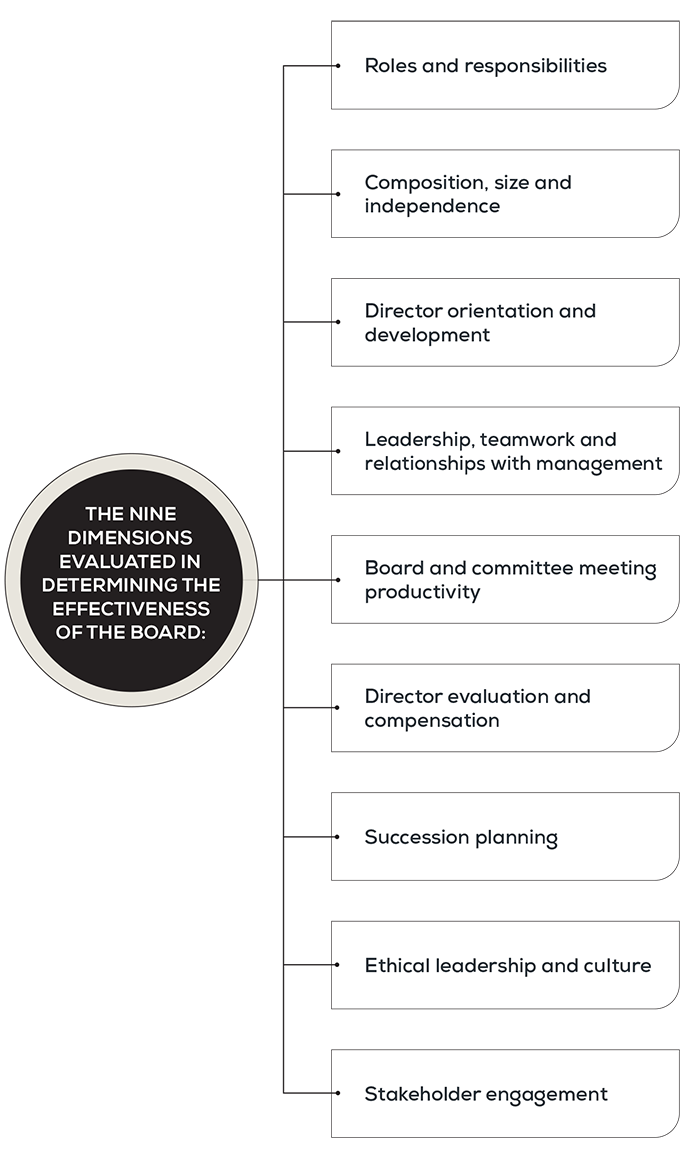
The Truworths International board provides ethical and strategic direction and leadership to the Group. The board is accountable for the overall strategy, governance and performance of the Group.
| BOARD OF DIRECTORS | Hilton Saven |
Hans Hawinkels |
Rob Dow |
Dawn Earp |
Tshidi Mokgabudi |
Thabo Mosololi |
Daphne Motsepe |
Wayne Muller |
Roddy Sparks |
Tony Taylor |
Michael Mark |
Sarah Proudfoot |
Emanuel Cristaudo |
||
| Diversity of expertise | Policy: To have a well-rounded board with the necessary skills and expertise to govern effectively and satisfy business requirements. | Independent non-executive director/ Chairman |
Lead independent director/ non-executive director |
Independent non-executive director |
Independent non-executive director |
Independent non-executive director |
Independent non-executive director |
Independent non-executive director |
Independent non-executive director |
Independent non-executive director |
Independent non-executive director |
Executive director/ Chief Executive Officer (CEO) |
Executive director/ Joint Deputy CEO |
Executive director/ Joint Deputy CEO/Chief Financial Officer |
||
| Expertise | Collective expertise | ||||||||||||||
| Strategic planning | 100% | ||||||||||||||
| Finance and taxation | 77% | ||||||||||||||
| Retail | 31% | ||||||||||||||
| Corporate affairs and communication | 77% | ||||||||||||||
| Financial services | 54% | ||||||||||||||
| Information technology and communication | 23% | ||||||||||||||
| Risk management, compliance and governance | 85% | ||||||||||||||
| Distribution and logistics | 31% | ||||||||||||||
| Human resources and transformation | 23% | ||||||||||||||
| Corporate finance, mergers and acquisitions | 69% | ||||||||||||||
| Marketing | 23% | ||||||||||||||
| Sustainability matters | 38% | ||||||||||||||
| Board committees |
Committee chair |
Committee member
| |||||||||||||
| Remuneration | |||||||||||||||
| Risk | |||||||||||||||
| Nomination | |||||||||||||||
| Audit | |||||||||||||||
| Social and Ethics | |||||||||||||||
Notes: Financial services includes insurance. Corporate affairs and communication includes CSI.
AGE AND TENURE
Policy: Directors are appointed to the board based on skill, leadership, integrity, experience, diversity and business requirements. No maximum age limit is applicable, and tenure on the board is determined with reference to individual contribution and engagement as assessed through the annual director evaluation process.
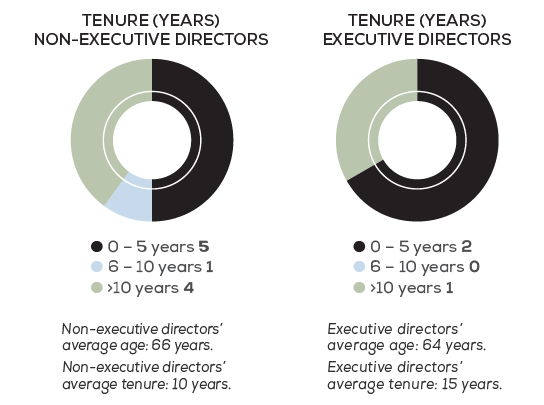
INDEPENDENCE
Policy: The majority of the board should consist of non-executive directors, the majority of whom should be independent. Categorisation of non-executives as independent is based on the board's assessment of independence.
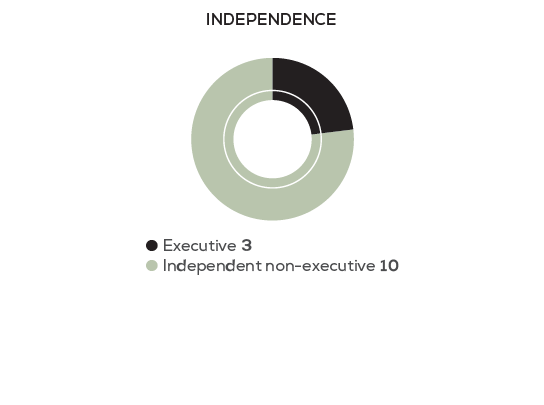
GENDER, RACIAL AND BROAD DIVERSITY
Policy: Voluntary medium-term targets are set within the board’s gender, racial and broad diversity policy. In 2017, the board resolved that at least 30% of the board should comprise females in the medium term. In 2018, the board resolved that at least 30% of the board should comprise black directors in the medium term.
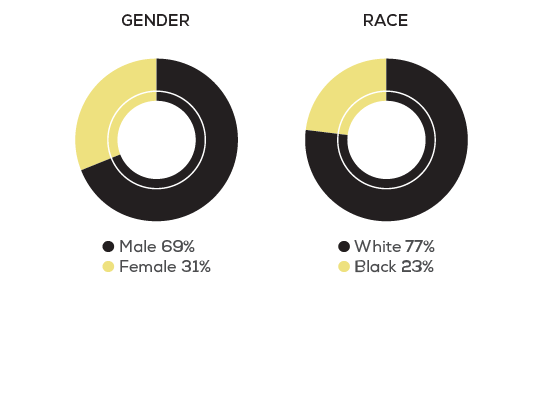
BOARD SIZE AND TURNOVER
Policy: The board should comprise sufficient directors, having regard for suitable diversity of skills, experience and background in order to meet regulatory requirements and ensure the board and board committee workloads are adequately performed.
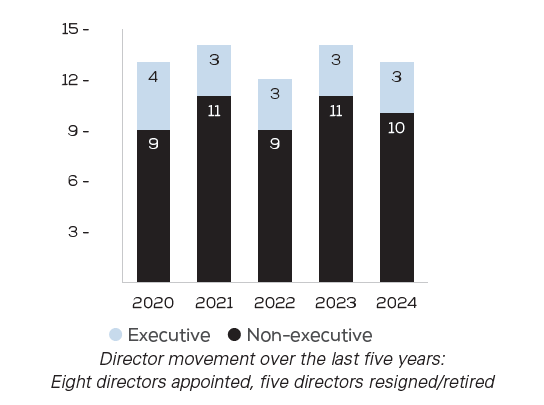
SUMMARISED GOVERNANCE REVIEW
During the 2024 financial period, the Group continued to practise corporate governance at a high level, aimed at adding value to the business, as well as facilitating the Group's sustainability, generating long-term shareholder value and benefitting other stakeholders.
Governance in the Group is an important consideration and accordingly compliance with codes, legislation, regulations and listings requirements is the minimum requirement. Management has adopted sound corporate governance principles and appropriate governance structures and policies, and believes it has embedded a business-wide culture of good governance that is aligned with the Group's Business Philosophy.
An indicator of the level of governance regarding the Group's financial reporting is the ranking of its 2023 Integrated Report in 7th place in the Ernst & Young (EY) 2024 Excellence in Integrated Reporting Awards. This is the 17th consecutive year that the Group has attained a top 10 ranking in the EY excellence in reporting awards, and is the only JSE-listed company to achieve this acknowledgement, reflecting the consistently high quality of its financial and integrated reporting and the accountable and transparent manner in which it reports to stakeholders.
The directors confirm to the best of their knowledge and belief that, based on a written assessment conducted by Group management in preparation for the submission of the company's annual Compliance Checklist to the Companies and Intellectual Property Commission (CIPC), pursuant to the CIPC's compliance monitoring and enforcement mandate in terms of the Companies Act (71 of 2008, as amended), the company is in compliance with the provisions of said Act and is operating in conformity with its memorandum of incorporation (MOI).
The directors confirm that during the 2024 reporting period, the Group has, in all material respects, voluntarily applied the King IV Report on Corporate Governance™* for South Africa, 2016 (King IV) principles and complied with the mandatory corporate governance provisions in the JSE Listings Requirements.
This report is a summary of corporate governance matters within the Group and should be read in conjunction with the detailed Report on Corporate Governance and Application of King IV Principles 2024 and the Environmental, Social and Sustainability Governance Report 2024 available at www.truworths.co.za/reports.
| * | Copyright and trademarks are owned by the Institute of Directors in South Africa NPC and all of its rights are reserved. |
GOVERNANCE DEVELOPMENTS IN 2024
While the board believes the Group has achieved a suitably high level of maturity in relation to governance, the relevant processes, policies and structures are continually reviewed and modified. The following enhancements were made to the Group's governance framework during the period:
| GOVERNANCE ELEMENT | GOVERNANCE DEVELOPMENT | ||
| Audit Committee | The Audit Committee updated its policy on the provision of non-audit services by the external auditor to embrace the principle of pre-concurrence in alignment with the amended Independent Regulatory Board of Auditors Code. The Chairman of the Audit Committee was appointed as a member of the Office Audit Committee. The Committee adopted a process for formally assessing the skills of its members. | ||
| Board composition | Daphne Motsepe and Wayne Muller were appointed as independent non-executive directors of the company with effect from 1 August 2023. Hans Hawinkels, who has served on the board since February 2018, was appointed as lead independent director with effect from 1 September 2023. Maya Makanjee retired as a non-executive director and member of the Social and Ethics Committee with effect from 9 November 2023. | ||
| Board committees | Dawn Earp was appointed as a member of the Risk Committee with effect from 1 July 2023. Wayne Muller was appointed to the Remuneration and Nomination Committees with effect from 1 September 2023. | ||
| Board race and gender diversity policies | The board continued the implementation of its race and gender diversity policies at board level towards the adoption of its medium-term targets of 30% black and 30% female representation, respectively. Following the appointments of Wayne Muller and Daphne Motsepe with effect from 1 August 2023, and the retirement of Maya Makanjee with effect from 9 November 2023, 23% (three ex 13) of board members were black and 31% (four ex 13) were female. | ||
| Business ethics | The Group updated and created awareness of its Business Ethics and Integrity Code. | ||
| External auditor | The Group appointed Deloitte & Touche to replace Ernst & Young as external auditor with effect from the 2024 financial period. | ||
| Financial management | The addition of resources to the Group's financial management teams, and the further restructuring of Office's financial management team which reports directly to a South African-based head of finance, were continued. | ||
| Remuneration governance | The Group again engaged with consultants to conduct a review of the Group's disclosures relating to its remuneration policies and practices. Management engaged with certain shareholders regarding the Group's remuneration policies and practices. |
||
2025 GOVERNANCE PRIORITIES
Governance priorities for the 2025 financial period will include:
- The ongoing development of governance and risk management within the Office segment.
- Further developing sustainability and ESG reporting capabilities within the Group.
- Further progressing top and senior management and non-executive director succession plans.
The board will continue to follow an approach of continuous incremental improvement regarding governance practices and structures to ensure the reasonable expectations of stakeholders regarding the Group's corporate governance standards are met.
2025 BOARD PRIORITIES
Board priorities for the 2025 financial period will include:
- Ensuring that the board continues to provide ethical leadership so that the Group operates within a culture of integrity and compliance.
- Monitoring the further implementation of management's plans to grow the Office business.
- Ensuring that the Group's strategies continue to maintain momentum, notwithstanding low-growth environments so that the attainment of the Group's strategic objectives remains on track.
- Continuing to ensure that the Group's strategies for managing its key risks and suitably dealing with its material issues are appropriately implemented and regularly reviewed.
- Ensuring that further progress is made regarding the succession of top and senior management in the Group.
- Continuing to ensure that the performance of executive management against financial and other targets is regularly reviewed.
- Monitoring management's progress with regard to finalising the development and commissioning of the new distribution centre in South Africa.
- Monitoring and promoting progress in relation to the Group's ESG objectives, including the adoption of ESG reporting requirements and frameworks.






